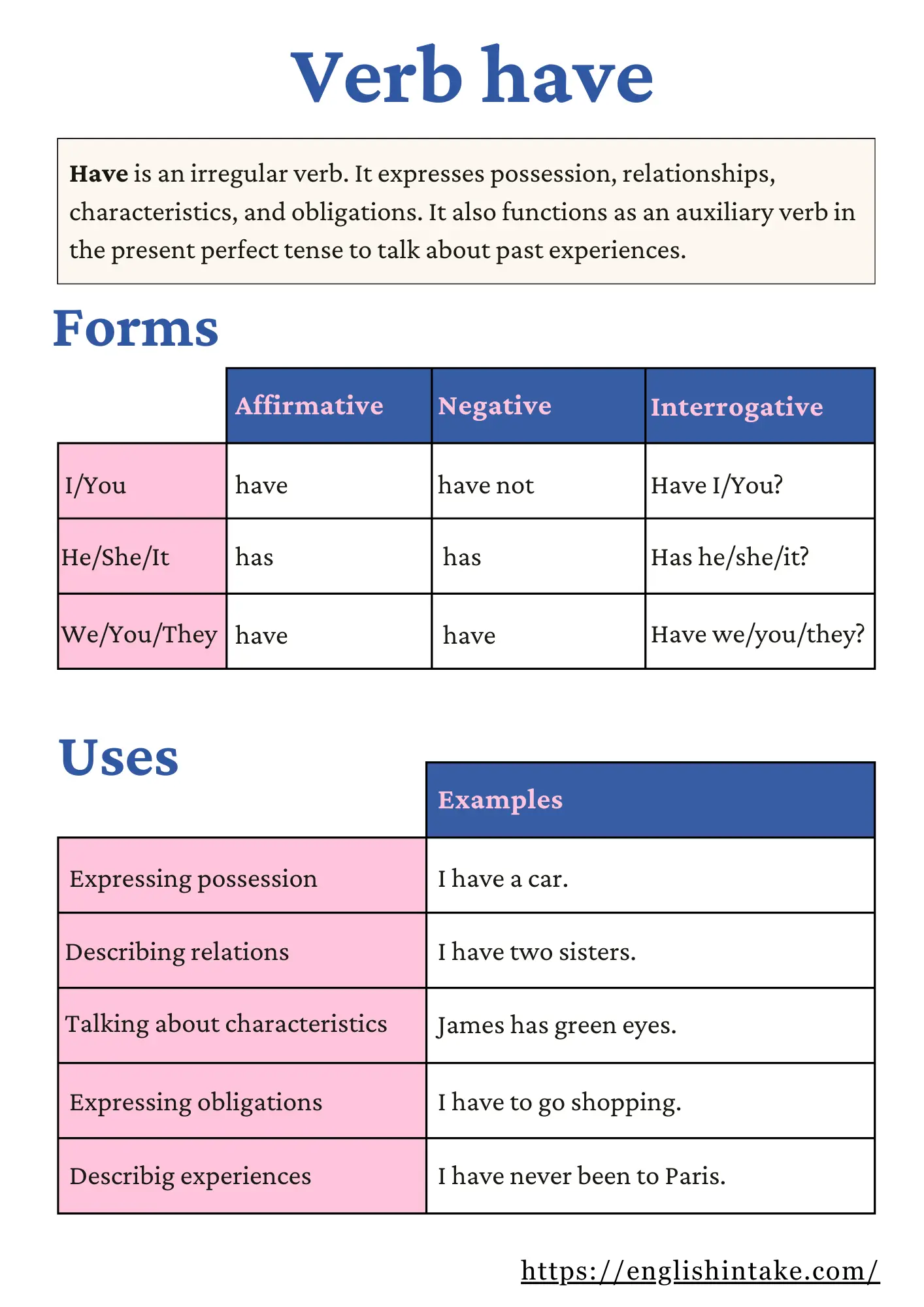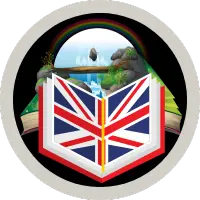The verb have is an irregular and auxiliary verb. We use it to form the perfect tenses, express possession, talk about our experiences and obligations, and describe our relationships with someone or something.

The video below explains the use of have in different tenses.
1. The verb have in the present simple tense
Positive (+)I have
You have
He has
She has
It has
We have
You have
They have
Short Form (+)I’ve
You’ve
He’s
She’s
It’s
We’ve
You’ve
They’ve
Negative (-)I have not
You have not
He has not
She has not
It has not
We have not
You have not
They have not
Short Form (-)I haven’t
You haven’t
He hasn’t
She hasn’t
It hasn’t
We haven’t
You haven’t
They haven’t
InterrogativeHave I?
Have you?
Has he?
Has she?
Has it?
Have we?
Have you?
Have they?
Interrogative (-)Have I not?
Have you not?
Has he not?
Has she not?
Has it not?
Have we not?
Have you not?
Have they not?
Short form (?-)Haven’t I?
Haven’t you?
Hasn’t he?
Hasn’t she?
Hasn’t it?
Haven’t we?
Haven’t you?
Haven’t they?
2. Use of the verb have
2.1 Indicating possession
Examples
1. I have a dog.
2. You have a new car.
3. He has a big house.
4. She has a beautiful dress.
5. It has a long tail.
6. We have a garden.
7. They have many friends.
8. I have a bicycle.
9. You have a smartphone.
10. He has a laptop.
11. She has a camera.
12. It has sharp teeth.
13. We have a swimming pool.
14. They have a cat and a dog.
15. I have two sisters.
16. Do you have any sisters?
17. Don’t you have a car?
18. I don’t have a computer.
2.2 Describing medical conditions or health issues
Examples
1. I have a cold.
2. She has a fever.
3. He has the flu.
4. My friend has a cough.
5. The baby has an ear infection.
6. My grandmother has arthritis.
7. His father has high blood pressure.
8. Her sister has diabetes.
9. My cousin has asthma.
10. My brother has a stomach ache.
11. Her daughter has chickenpox.
12. My uncle has a toothache.
13. The dog has a skin rash.
2.3 Expressing relation and characteristics
Examples
1. Jane has two sisters.
2. My car has a flat tire.
3. Stacy has a great sense of humour.
4. This song has a catchy tune.
5. That restaurant has a five-star rating.
6. She has a twin brother.
7. The software has a user-friendly interface.
8. He has blue eyes.
9. My cousin has a strong passion for environmental causes.
10. The city has a great architecture.
2.4 Talking about obligations
To express obligations in the present simple form, we use the structure have to + base verb. It indicates that something must be done. The form changes depending on the subject and tense.
In the present simple, we use have to for I/you/we/they and has to for he/she/it. In the past simple form, it becomes had to for all subjects. The negative forms (don’t have to, doesn’t have to) show that something is not required.
1. I have to wake up early tomorrow.
2. She has to wear a uniform at school.
3. We have to submit the form by Friday.
4. They have to finish their homework before dinner.
5. He has to see a doctor today.
6. You have to show your ID at the entrance.
7. My brother has to clean his room every weekend.
8. The kids have to be in bed by 9 p.m.
9. I had to leave the party early last night.
10. She had to take a bus because her car broke down.
11. We had to wait in line for hours.
12. Do I have to attend the meeting?
13. Does he have to pay now or later?
14. You don’t have to come if you’re busy.
15. He doesn’t have to work on Sundays.
2.5 Describing experiences
We can use the verb have in the present perfect from (have/has + past participle) to talk about our past or recent experiences.
1. I have visited Italy twice.
2. She has never ridden a horse.
3. Have you ever eaten something strange?
4. We have already eaten dinner.
5. They have just finished their exams.
6. He has met a famous actor.
7. I have never tried sushi.
8. Have you ever been to Australia?
9. She has travelled to five countries.
10. We have watched that film before.
11. I have lost my phone three times this year.
12. They have taken part in a marathon.
13. Has she ever broken a bone?
14. I have made a lot of new friends lately.
3. Common expressions
There are several expressions using the auxiliary verb have. Let’s look at some of the most commonly used ones.
To have a goTo try something
Can I have a go at solving the puzzle?
To have a look at (something or someone)To inspect or examine something
Have a look at this photo and tell me what you see.
To have a breakTo take a rest or pause from an activity
Let’s have a break after two hours of study.
To have a good timeTo enjoy oneself
I had a good time at the party last night.
To have a shower/bathTo bathe oneself
I have a shower every morning.
To have a wordTo speak or discuss something briefly
Can I have a word with you in private?
To have an ideaTo think or suggest something
I have an idea! Let's go camping this weekend.
To have a sayTo express one's opinion
Everyone should have a say in this decision.
To have a dreamTo experience a dream during sleep or to hold a personal vision or aspiration
I had a strange dream last night.
To have a feelingTo sense or believe something without concrete evidence
I have a feeling it's going to rain soon.
To have trouble/difficultyTo experience challenges
I’m having trouble understanding this concept.
